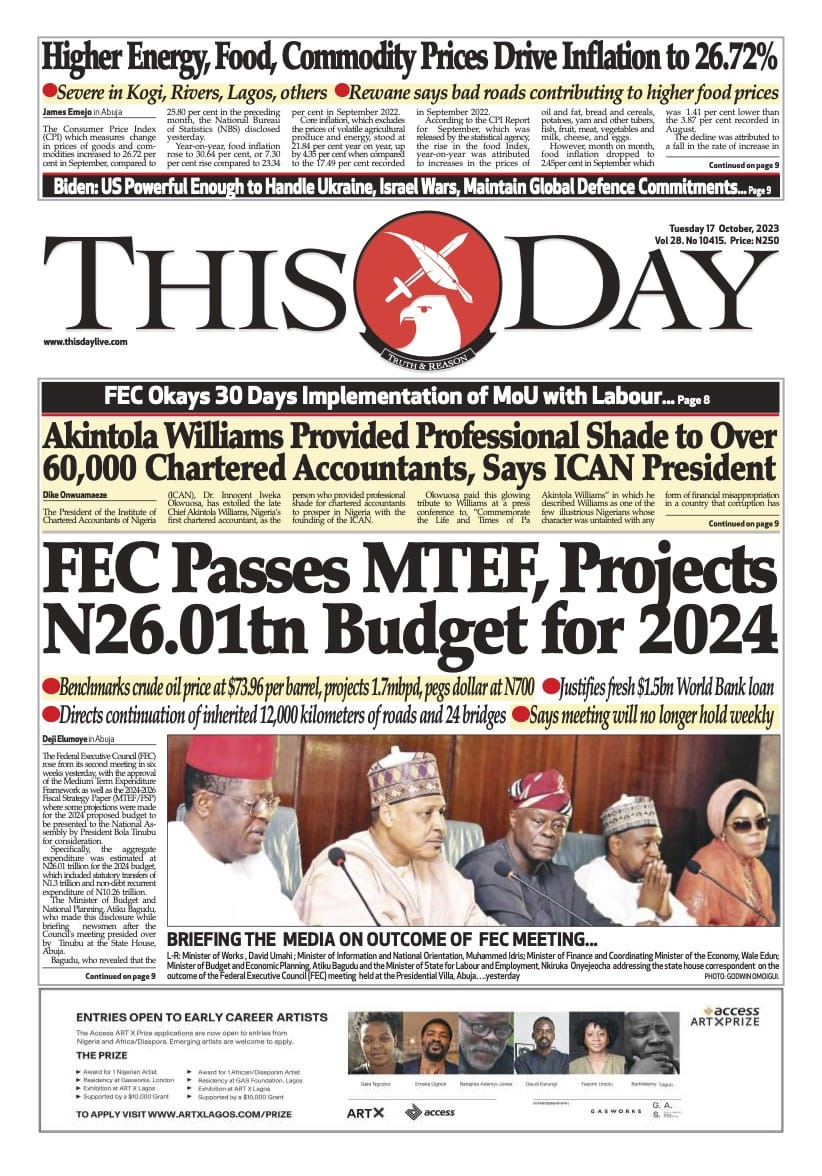War in the Middle East
Three reasons why a higher oil price might not benefit Nigeria
The world has watched in horror as another war has broken out between Israel and Palestine in Gaza. This happened after the Palestinian militant group Hamas, which ‘‘governs’’ Gaza, launched an audacious and bloody attack on Israel, killing over a thousand people. Israel has retaliated by relentlessly bombing Gaza, with over a thousand dead and counting. This is all very tragic and I hope there is a practical way to halt this cycle of bloodshed very soon. The conflict has a very long history and complex dynamics, one that I do not know nearly enough to speak about.
But one thing caught my attention as I read an essay (paywall, sorry) by the historian Niall Ferguson. He is worried that influential countries and their leaders might be underestimating the possible repercussions of the conflict. Indeed, many are worried that a ground invasion of Gaza (which Israel seems poised to do) might risk a bigger proxy war that draws in the United States and Iran. The example that interested me in Ferguson's essay was how the Yom Kippur War in 1973 (the 50th anniversary of which Hamas timed the attack on Israel) led to the infamous Arab oil embargo - which sent oil prices through the roof:
Fifty years ago, almost to the day, Egyptian and Syrian forces, backed and armed by the Soviet Union, launched the 1973 “Yom Kippur” war against Israel. The news at the time was dominated by the dramatic ebb and flow of events on the principal battlefields along the Suez Canal and in the Golan Heights, closely followed by the frenetic efforts of Henry Kissinger, newly promoted to the post of secretary of state, to negotiate a ceasefire.
Yet the second-order consequences became clear only later — namely that the Egyptian leader Anwar Sadat’s true motive was to achieve a lasting peace with Israel based on respect, rather than disdain, for its Arab neighbours; and that Kissinger’s main objective was to terminate the influence of the Soviet Union in the Middle East.
It took two weeks after the initial Arab offensive for the third-order consequences to manifest themselves. Kissinger had underestimated the readiness of the Saudi ruler, King Faisal, to impose an oil embargo on the US and other countries that supported Israel, including Canada, Japan and the Netherlands.
What does this have to do with Nigeria? Well, crude oil export still matters to the Nigerian economy despite its weakening contribution to the government's revenue. And if oil prices do skyrocket due to a prolonged conflict in the Middle East, policymakers might think this is a boon to the country's economy and struggling finances. But I can think of three reasons why this will be a problematic assumption at least.
The first is that higher oil prices will cause higher prices of local fuels, and add to the worsening problem of inflation. There are estimates that the sudden price jump from the removal of subsidy on petrol may have cut domestic petrol consumption by as much as 30%, with many retailers complaining about working capital, lack of clarity of the subsidy regime, and other supply-related problems. Higher global oil prices may exacerbate these problems and will lead to political pressures, and indeed government interventions in ways that are not good for the overall economy. Already there are plans to raise the wages of civil servants, and the government has already made a colossal mess of efforts to provide relief for poor households. Higher domestic prices from higher oil prices will not make things easier.
Secondly, benefiting from an oil price surge requires Nigeria to consistently maintain high domestic crude production and exports. That has not been the case for a while. It has become an article of faith to blame insecurity and ‘‘oil theft’’, but even that along with the governance failures of the industry cannot be resolved immediately - hence I am skeptical that the investment and expertise required to maintain high production levels can quickly manifest for Nigeria to benefit from one price boom cycle. This was already made clear by the absence of any significant windfall from the Russia-Ukraine war that started over a year ago. (You can read more here and here about the challenges of the Nigerian oil industry from 1914 Reader).
The third point may already be moot before these words are public. A higher oil price could provide an excuse and incentive to continue making unrealistic budgets. Waziri Adio in his excellent column last Sunday laid out the basic case for what is wrong with the Federal Budget in his review of the Budget Implementation Report by the budget office:
Truth is: we have been goofing around in the name of budgeting. We pretend to be busy with diligently preparing, vetting, approving, signing and implementing annual budgets. We dutifully go through the whole ritual. But it is more of a hollow ritual. It is time to stop the self-deception and stop making and passing budgets that we have no intention of implementing or that we have no plan of using as a mechanism for fiscal discipline.
Overall, however, the report underscores what most people already know: our public finance is not in a good place. Total revenue for the FG in 2022 was N5.870 trillion. That was 35% lower than the N9.012 trillion projected as revenue for the year. This is not an isolated event: it happens year in, year out. It is not that revenue projection constantly falls below target by a few points, but by a significant proportion. There is definitely something wrong with a revenue forecast that is off by a third. It is either the forecasters are playing games or they are incompetent. Or both.
I have not read the new budget proposal, but the minister of finance already said it will be based on a conservative oil price benchmark. The problem is not the benchmark per se - it is that a higher oil price may encourage the government to expect a windfall and keep making unrealistic revenue projections. This means that there will be no urgency to deal with the unsustainable budget deficit, and even worse - the government can think that we can keep borrowing to finance the deficit. An even bigger worry is big deficits leave little room to raise new debts, which means that the problem of relying on the central bank's ‘‘monetary financing’’ is not going away anytime soon. Economics blogger Darwin Shelleng has a good short piece (with some cool graphs) on the link between poor revenue forecasting and monetary financing - ultimately what we have gotten out of it is inflation.
Of course we can remember from our Econ 101 classes. More money chasing the same goods equals inflation. Ergo, faster money supply growth with a slower economy equals higher inflation as shown in Fig 1.
I know. I know. There’s the argument about supply shocks being behind inflation but that is not really the case here. Not that supply shocks don’t matter but even if you didn’t have supply shocks you would still have higher than normal inflation because of how fast money supply has been growing.
To be honest, I am not yet convinced the new government is serious about reforming the Nigerian economy - and the bits I am hearing from the new budget do not abate my doubts. Rising oil prices will just make the incentive problem much worse. Feyi has a great piece on how the budget can be a powerful tool to begin a reform




An interesting angle to the Middle East crisis as it relates to Nigeria and its development trajectory.
The last paragraph sums up this new government. They are not serious about making any meaningful changes that will right the wrongs of the last administration. They haven't curbed spending, they are set to borrow again and so far they haven't made any serious moves to reduce corruption. In fact, they've rewarded many politicians that have been implicated in corruption probes at one time or the other.
It's unfortunate that we might be stuck with them for the next 4 years. It doesn't bode well for the country.